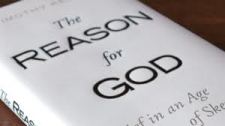 This is a reply to Stephen Law’s “evil god” argument he gave in his debate with William Lane Craig in October. I first posted a version of it in a comment to my blog post here, in reply to Jason Thibodeau.
This is a reply to Stephen Law’s “evil god” argument he gave in his debate with William Lane Craig in October. I first posted a version of it in a comment to my blog post here, in reply to Jason Thibodeau.
Stephen Law cooks up an evidential problem of good against an evil god (reverses the theistic answers to the evidential problem of evil) and then asks why the evidential problem of evil isn’t an equally good argument. Actually, he asks, “if the evil god hypothesis can, solely on the basis of observational evidence, be ruled out as highly unlikely, why can’t we similarly rule out the good god hypothesis?”
Law considers the privation bit below to be “more of a Catholic thing” which is false—it is not restricted to Catholicism. I’m not sure ‘why’ Dr. Craig ignores it, but his argument (which Law pretty much ignores) does allude to it:
1. If God does not exist, objective moral values do not exist.
2. Evil exists.
3. Therefore, objective moral values exist. (Some things are evil!)
4. Therefore, God exists.
But here’s the privation bit, which goes back to Augustine.
In order to sin or commit evil, there must first be a way things ‘should’ have gone—a way things are ‘supposed’ to be—a real ‘ought’—a preexistent good. A falling short (sin), or privation (evil) [sin=evil], of the way things are supposed to be (the good), cannot exist unless there really is a way things are supposed to be. See how similar this sounds to Dr. Craig’s argument?
1. If God does not exist, “the way things are supposed to be” (a real ought/good) does not exist.
2. Evil (privation of a real ought/good) exists.
3. Therefore, “the way things are supposed to be” (a real ought/good) exists.
4. Therefore, God exists.
So—first exists the way things are supposed to be, without which a falling short (sin), or privation (evil), is impossible (again, sin=evil).
That good—that ‘way’ things are supposed to be—if there IS one—is God.
God, because he is omnipotent, cannot fall short of himself, cannot be a privation of himself, cannot depart from the way things are supposed to be (himself). [Such falling short, privation, departing–all of those things are weakness.] Therefore, God can never be evil. He has the choice—he will just never choose it, because that would be weakness, and he is omnipotent. This argument goes back to Aquinas.
In short, evil cannot exist without a preexistent good, so whether one observes evil or good, neither can be used to argue for an evil god (because it cannot exist without a preexistent good which is more ultimate), whereas both can be used to argue for a good god (because the presence of good, as well as the presence of evil, requires the existence of a real ‘way things are supposed to be’—God).
This does not prove the existence of God, of course, but it does give us “very good grounds” (Law)—whereas the existence of an evil god is logically incoherent.










Good post!
I wrote up a different way of responding on my own blog. If you would like, you can read it here:
http://jcordray.wordpress.com/2011/11/15/the-evil-god-challenge-from-professor-stephen-law/
I think one thing Law does not take into account is how an adequate answer to the logical problem of evil mitigates the difficulties of the evidential problem of evil. His original paper is at:
http://www.google.co.uk/url?sa=t&rct=j&q=evil%20god%20hypothesis&source=web&cd=8&ved=0CFAQFjAH&url=http%3A%2F%2Fjournals.cambridge.org%2Frepo_A72V8TEm&ei=jynCTpeHHMjC8QOl1dS0CA&usg=AFQjCNG-9GURZgA5VsaesxAhswZom0aUig
A nice try to counter him but surely he could just say that, on the basis of that thinking, if good is required to understand evil then that can be turned around to say that evil is required to understand the good?
In fact this would then favour a non-Christian metaphysic such as dualism where the suggestion is that both must always coexist.
If one is going to state that the good must be PRIOR to evil then one has to give an argument for that and I don't see one here.
Anonymous, thanks for replying. Click on either Augustine or Aquinas in the original post. :)
Anonymous…to put the answer in my own words, a falling short (sin), or privation (evil) [sin=evil], of the way things are supposed to be (the good), cannot exist unless there really is a way things are supposed to be. So–first exists the way things are supposed to be, without which a falling short (sin), or privation (evil), is impossible (again, sin=evil). That good–that 'way'–is God. God, because he is omnipotent, cannot fall short of himself, cannot be a privation of himself, cannot depart from the way things are supposed to be (himself). Such falling short, privation, departing–all of those things are weakness. Thanks again for replying. Merry Christmas :)
Anonymous, also, you are using words like “understand” — which is in the language of epistemology — together with words like “metaphysic” — which is in the language of ontology. There is a distinction. Even if it is true that we cannot 'understand' 'either' good 'or' evil unless we understand 'both' good 'and' evil (the burden is yours to bear there–and my epistemology of the Golden Rule shows otherwise), it does not follow that both must exist in order for either to exist.
Law could easily turn Aquinas response around and say that evil is the way things are suppose to be and a falling short of evil (sin) or privation (good) cannot exist unless there really is a way things are suppose to be. So–first exists the way things are supposed to be, without which a falling short of evil (sin), or privation (good), is impossible (again, sin=good). That evil–that 'way'–is God. God, because he is omnipotent, cannot fall short of himself, cannot be a privation of himself, cannot depart from the way things are supposed to be (himself). Such falling short, privation, departing–all of those things are weakness.
Chuck…you're calling a skunk a rose, and a rose a skunk, but the only one you're fooling is yourself.